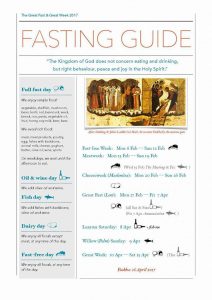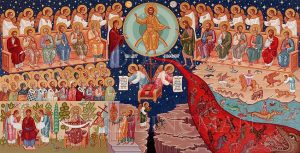 Today, the Church begins her preparations for the Great Fast ( aka, Great Lent).
Today, the Church begins her preparations for the Great Fast ( aka, Great Lent).
In the coming weeks we will delve into what the Great Fast means for us.
Archpriest David Petras writes,
In our preparation for the Great Fast, we must notice a theme emerging. In the parable of the Pharisee and the Tax Collector, the Pharisee was not justified because he failed to see the image of God in the tax collector. (“I thank you that I am not like this tax collector,” Luke 18:11). In the Parable of the Prodigal Son, the older son was not justified because he failed to see the image of God in the prodigal returned home. (“But as soon as this son of yours came, who has devoured your livelihood with harlots, you killed the fatted calf for him,” Luke 15:20).
Today, in the final judgment, the Lord says to the condemned goats, “Assuredly, I say to you, inasmuch as you did not do it (show charitable works of mercy) to one of the least of these, you did not do it to me” (Matthew 25:45). In the popular mind, Lent is a time for self-denial. Stop, that’s it. But why? Because if we do not deny ourselves, we cannot see the image of God in the other, in each and every other human being that he has created.
Possibly the Last Judgment was commemorated on this Sunday, because it is the conclusion of a “Church Year.” Next Sunday, Cheesefare Sunday, we begin again with the story of Adam and Eve and the Fall.
The Great Fast is our journey through the Old Testament, which is concluded with the New Covenant: the Mystical Supper, the Crucifixion and the Glorious and Life-giving Resurrection of our Lord and God and Savior Jesus Christ. We then see through the lens of the Resurrection how God’s plan is fulfilled in Christ in the Gospel of John the Theologian (until Pentecost), in the Gospel of Matthew (from Pentecost to the Exaltation of the Cross), and in the Gospel of Luke (from the Exaltation of the Cross until the Sunday of the Prodigal Son).
Then on this Sunday, we celebrate the last and final and eschatological mystery of the Final Judgment, in which God brings to completion and perfection the whole human story. That may be why, on the day before the Sunday of the Last Judgment, we remember the death of each human being, which is the completion and perfection of our own individual story and our inclusion in God’s ultimate divine plan. Interestingly, the Roman Church read the Gospel of the Final Judgment on the last Sunday before Advent, which began their liturgical year.
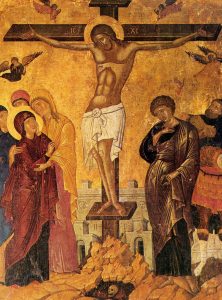 For our prayer today…
For our prayer today…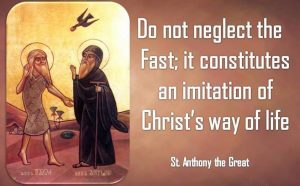 Archpriest David Petras reviews some hallmarks of the liturgical observance and prayer.
Archpriest David Petras reviews some hallmarks of the liturgical observance and prayer.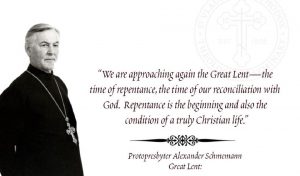
 Today, the Church begins her preparations for the Great Fast ( aka, Great Lent).
Today, the Church begins her preparations for the Great Fast ( aka, Great Lent).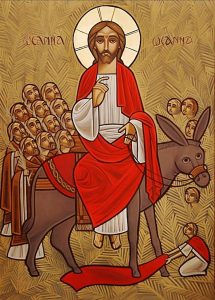 As a preparation for Holy Week and Pascha, the Gospel of the passion of our Lord according to St. Mark is read. Today Jesus enters Jerusalem as the people exclaim, “Hosanna! Blessed is he who comes in the name of the Lord! Which we sing at every Liturgy in the Anaphora. These acclamations proved to be hollow, when the priests and elders seduced the mob to ask for Jesus’ crucifixion.
As a preparation for Holy Week and Pascha, the Gospel of the passion of our Lord according to St. Mark is read. Today Jesus enters Jerusalem as the people exclaim, “Hosanna! Blessed is he who comes in the name of the Lord! Which we sing at every Liturgy in the Anaphora. These acclamations proved to be hollow, when the priests and elders seduced the mob to ask for Jesus’ crucifixion.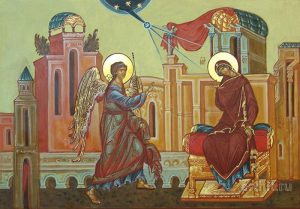 This weekend we are celebrating the mystery of our Lord’s accepting human nature for our salvation. The Archangel Gabriel asks Mary to receive God’s plan and become the mother of the Son and Word of God, to be named “Jesus,” “Savior.” Mary replies, “Behold, I am the handmaid of the Lord. May it be done to me according to your word. (Luke 1:38)” Mary’s response to God was perfect and reversed the sin of Eve. In our Lenten journey, we
This weekend we are celebrating the mystery of our Lord’s accepting human nature for our salvation. The Archangel Gabriel asks Mary to receive God’s plan and become the mother of the Son and Word of God, to be named “Jesus,” “Savior.” Mary replies, “Behold, I am the handmaid of the Lord. May it be done to me according to your word. (Luke 1:38)” Mary’s response to God was perfect and reversed the sin of Eve. In our Lenten journey, we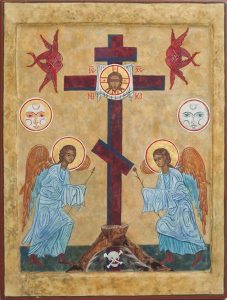 The first half of the Great Fast tells us the stories of Adam and Eve and their children, and the flood of Noah. It is a story of the creation of a perfect world and how that has been marred by human sin. It tells of the end of paradise, “The Lord God therefore banished him from the garden of Eden, to till the ground from which he had been taken. He expelled the man, stationing the cherubim and the fiery revolving sword east of the garden of E
The first half of the Great Fast tells us the stories of Adam and Eve and their children, and the flood of Noah. It is a story of the creation of a perfect world and how that has been marred by human sin. It tells of the end of paradise, “The Lord God therefore banished him from the garden of Eden, to till the ground from which he had been taken. He expelled the man, stationing the cherubim and the fiery revolving sword east of the garden of E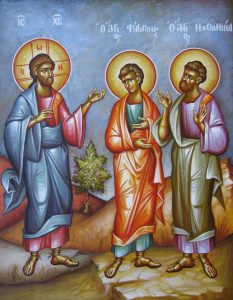 This Sunday is called the “Sunday of Orthodoxy” because it commemorates the restoration of the Church’s teaching on making images (icons) of our Lord and the saints in the year 843. Before that, it was the Sunday of the Commemoration of the Holy Prophets. This explains the Gospel, Phillip witnesses to Nathanael: “We have found him of whom Moses in the law and also the prophets, wrote – Jesus of Nazareth, the son of Joseph.” This is our goal in the Great Fast – to find our faith in Jesus. The Great Fast was the training period for those about to be baptized, and it was a time for the whole community to rediscover its faith. Along the journey to Holy Week, we read especially from the book of Genesis and from Isaiah to guide us to Christ, who will perfect his covenant with us by his death and resurrection. This is why, in the Apostolic reading, we remember Moses, Gideon, Barak, Samson, Jephthah, David and Samuel and all the prophets. It was all for Jesus, “Yet all these, though approved because of their faith, did not receive what had been promised. God had foreseen something better for us, so that without us they should not be made perfect. (Hebrews 11:39)”
This Sunday is called the “Sunday of Orthodoxy” because it commemorates the restoration of the Church’s teaching on making images (icons) of our Lord and the saints in the year 843. Before that, it was the Sunday of the Commemoration of the Holy Prophets. This explains the Gospel, Phillip witnesses to Nathanael: “We have found him of whom Moses in the law and also the prophets, wrote – Jesus of Nazareth, the son of Joseph.” This is our goal in the Great Fast – to find our faith in Jesus. The Great Fast was the training period for those about to be baptized, and it was a time for the whole community to rediscover its faith. Along the journey to Holy Week, we read especially from the book of Genesis and from Isaiah to guide us to Christ, who will perfect his covenant with us by his death and resurrection. This is why, in the Apostolic reading, we remember Moses, Gideon, Barak, Samson, Jephthah, David and Samuel and all the prophets. It was all for Jesus, “Yet all these, though approved because of their faith, did not receive what had been promised. God had foreseen something better for us, so that without us they should not be made perfect. (Hebrews 11:39)”